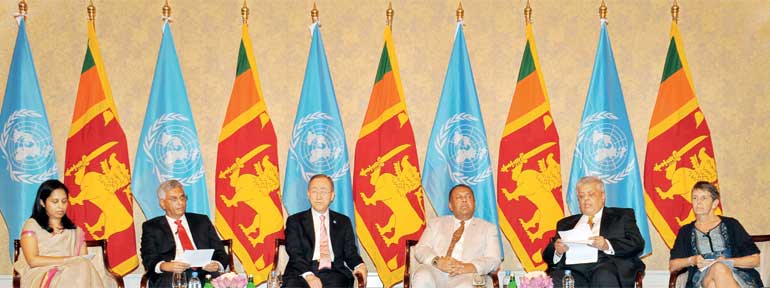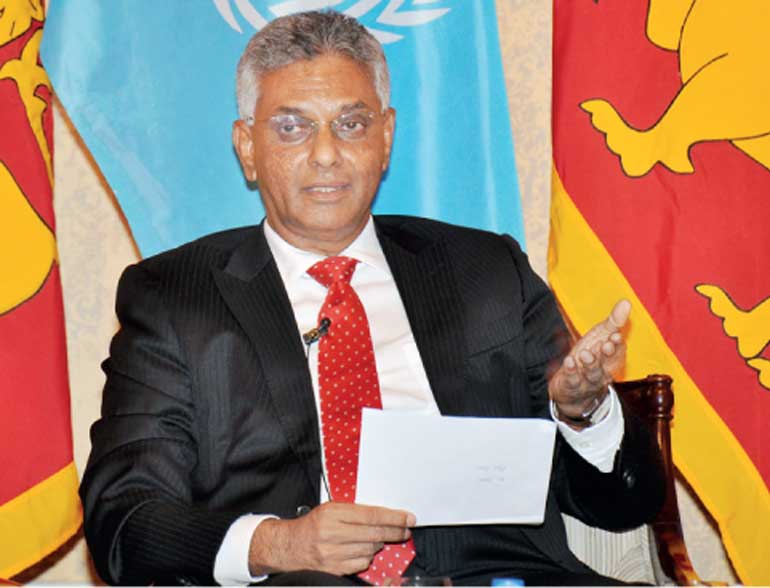Sunday Feb 22, 2026
Sunday Feb 22, 2026
Tuesday, 6 September 2016 00:02 - - {{hitsCtrl.values.hits}}

On behalf of the UN Global Compact (UNGC) local network, Aitken Spence and the private sector in Sri Lanka I thank the UN for the opportunity to speak on this occasion.
The UN Global Compact represents more than 300 companies in Sri Lanka and is proud to already be actively working to promote the SDGs, alongside the Government, UN and other development partners.
When the UN Global Compact was formed in the year 2000, it was with the objective of involving the private sector in the development plans of the world. If you look at the largest economic entities in the world, many entities are private organisations. The UN Secretary General at that time acknowledged the immense capacity and potential of the private sector to achieve global development goals
With the Sustainable Development Goals, this is still true: if the private sector champion the SDGs that are relevant to their own priorities, the country can achieve our development goals a lot faster.
Recently for example, in May of this year we came together with the Government, UN and other key partners for the very first multi-stakeholder Foresight and Innovation Summit. This was a landmark event, aimed at stimulating ideas and partnerships for the promotion of the SDGs.
 Dr. Rohan Fernando
Dr. Rohan Fernando
Highlighting the need for greater collaboration to achieve the post 2015 agenda, the summit resulted in a joint commitment by the Government, private sector, UN and development partners to establish a Policy Lab aimed at ensuring we use foresight and innovation to create appropriate frameworks that catalyse SDG achievement.
UNGC also initiated the collective corporate water stewardship program to address issues related to water in rural areas in partnership with UNGC CEO Water Mandate – Nearly 40 corporates were present at the launch.
We are also working with key influences to mainstream sustainability/UNGC principles in a meaningful manner to the corporate sector and one such initiative is working with CA Sri Lanka and CSE in raising and tweaking the voluntary disclosure requirement. We have also influenced the CSE to join UN Sustainable Stock Exchange last year and working closely with them.
Looking specifically at the theme of today’s event, which is sustaining peace – a central element of the SDGs – I would also like to share with you some of the ways in which the private sector in Sri Lanka is working to promote lasting peace
Most relevant to Sri Lanka is the benefits of promoting peace and the dividends of peace which one of the primary beneficiaries has been the Sri Lankan private sector.
The peace dividend whilst creating many opportunities in different ways opened out the north and the east of Sri Lanka which was not available for investment and also made easy access and free movement to the entirety of the country.
Tourism was one of the main beneficiaries of peace whilst other areas such as agriculture and infrastructure development had a major boost as a result of peace. Some of the most fertile land and areas of scenic beauty are in the north and east and this facilitated large private sector investments into hotels which in turn created decent jobs and respect and dignity for local communities. There was strong relationships being built between different communities which has paved the way for more sustainable livelihoods in these areas.
Perhaps most significant, since the end of the conflict, has been the role of the private sector in stimulating the economy, creating jobs and in so doing – delivering a peace dividend to conflict affected and marginalised communities.
There are many examples, but perhaps the most visible is tourism. The end of the conflict brought with it a dramatic rise in the number of tourists. While the traditional tourist locations in the South of the country expanded rapidly, with the support of the private sector, new markets opened in parts of the north, east and bordering areas – and with this came opportunities for jobs in the hotels and the supporting services – boat trips, suppliers of produce, handicrafts, etc.
In the food industry, there are also examples of how large buyers such as the supermarket chains, have worked closely with development partners and provided opportunities for farmers and fishermen from the former conflict affected areas to link up to their supply chains.
Similarly, often working in close collaboration with the Government and other development partners, we have also seen large apparel manufacturer’s move out of the more traditional geographical areas to establish factories in lagging areas including the north and east.
Such initiatives and partnerships not only help provide decent work opportunities, sustainable livelihoods and opportunities for youth but also provide opportunities for people from different communities to come together.
As different communities work together, share interests and goals, they gradually develop a better understanding of each other and foster long term friendships and partnerships. Such links and connections between the north and the south are an important component of reconciliation and lasting peace
As we move forward to work together to sustain peace and jointly achieve the SDGs, let me offer the full support of the UN Global Compact in Sri Lanka. The companies in the compact as well as the broader private sector look forward to working with the Government, UN and other development partners to promote an enabling environment for business, that stimulates investment and provides opportunities for development across Sri Lanka, and in particular in the most lagging regions.